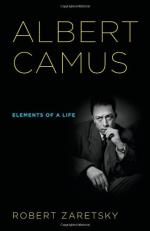|
This section contains 5,102 words (approx. 18 pages at 300 words per page) |

|
SOURCE: "The Dangers of Engagement: Camus' Political Esthetics," in Mosaic, Vol. XVII, No. 3, Summer, 1984, pp. 59-70.
In the following essay, Woolfolk discusses Camus's political sympathies and overriding artistic ideals. According to Woolfolk, Camus resisted participation in revolutionary causes due to his belief that political ideology limits the artist's experience and creative vision.
"True artists," Camus stated in his Nobel Prize acceptance speech, "force themselves to understand instead of judging." In this respect, he is not unlike his character Tarrou, the former political revolutionary in The Plague, who admits:
For many years I've been ashamed, mortally ashamed, of having been, even with the best intentions, even at many removes, a murderer in my turn. As time went on I merely learned that even those who were better than the rest could not keep themselves nowadays from killing or letting others kill, because such is the logic by which they...
|
This section contains 5,102 words (approx. 18 pages at 300 words per page) |

|


